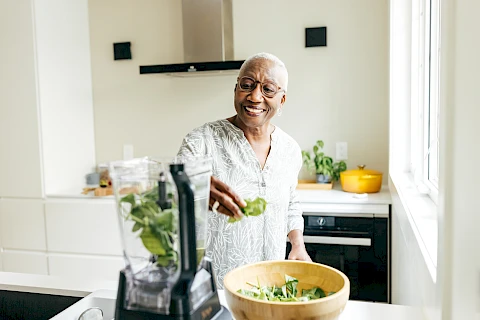
Diabetes affects how the body processes blood sugar, and many seniors face challenges in managing their condition. Thoughtful meal planning, understanding food labels, and making mindful choices when eating out can help maintain stable blood sugar levels and support better health. Improving seniors' dietary habits can make a meaningful difference in maintaining stable blood sugar levels and supporting daily health.
Diabetes and Nutrition
If blood sugar is not managed effectively, diabetes can lead to complications such as cardiovascular disease, nerve damage, and vision problems. Nutrition directly influences blood sugar levels, yet seniors may encounter challenges such as altered taste perception, reduced appetite, or difficulty preparing meals. Recognizing these factors can help seniors and their caregivers make dietary choices that support stable blood sugar and long-term well-being.
Meal Planning Tips
Proper meal planning helps stabilize blood sugar levels by balancing carbohydrates, proteins, and healthy fats. Seniors should incorporate whole grains, lean proteins, fresh vegetables, and low-sugar, nutrient-rich foods into their meals. Controlling portions and maintaining consistent meal timing can prevent spikes and drops in blood sugar.
How to Read Food Labels
Grocery shopping with diabetes in mind requires reading food labels carefully. When evaluating products, consider these components:
- Total carbohydrates — Check the number of carbohydrates per serving and prioritize foods with moderate or lower carbohydrate content.
- Sugars — Identify natural and added sugars, and favor options with minimal added sugar.
- Serving size — Compare the listed serving size with the portion you eat to understand the impact on blood sugar.
- Unhealthy fats — Look for saturated and trans fats, which can contribute to cardiovascular complications often associated with diabetes.
- Fiber content — Foods high in fiber can help slow the absorption of sugar and support steady blood sugar levels.
Careful examination of labels allows seniors and caregivers to make informed decisions, choose healthier alternatives, and better support blood sugar management.
Strategies for Eating Out
Seniors with diabetes can still enjoy dining out by choosing restaurants with nutritious or diabetes-friendly options. Opt for grilled, baked, or steamed dishes, request sauces and dressings on the side, and watch portion sizes. Skip sugary drinks and desserts, or swap them for healthier alternatives.
Benefits of Proper Nutrition
Eating with diabetes in mind helps maintain stable blood sugar levels and can reduce the likelihood of complications such as heart disease, nerve damage, and vision problems. Thoughtful food choices can support healthy weight management, sustain energy throughout the day, and enhance overall health. Seniors who manage diabetes successfully often combine balanced meals with medication and regular physical activity, allowing them to maintain independence, preserve strength, and enjoy daily activities.
Services to Help Seniors Manage Diabetes at Home
Balanced meals, careful attention to food labels, and mindful choices when eating out can help maintain stable blood sugar levels and support daily health. Seniors who adopt these habits may find it easier to follow their meal plans alongside medication and physical activity, reduce the risk of complications, and sustain their daily routines.
Senior Helpers Denver supports seniors and family caregivers in the Denver, Broomfield, Arvada, and Northglenn areas. Companion Care provides social interaction and encouragement for healthy habits, such as sticking to meal schedules, staying active, and engaging in light exercise, all of which support blood sugar management. Personal Care assists with meal preparation, grocery shopping, and organization of medications, helping seniors maintain healthy eating habits and manage blood sugar levels effectively. Chronic Disease Care delivers personalized at-home support for diabetes and other conditions, helping seniors stay on track with their health goals. Contact us to explore care options tailored to promoting healthy routines and independence.